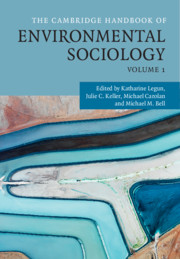Book contents
- The Cambridge Handbook of Environmental Sociology Volume 1
- The Cambridge Handbook of Environmental Sociology
- Copyright page
- Contents
- Figures
- Tables
- Contributors
- Foreword
- Introduction
- Part I Theory in Environmental Sociology
- Part II The Economy and Environmental Sociology
- Part III Culture and Environmental Sociology
- Part IV Politics, Power, State
- 17 Conflicting Environmental Imaginaries in Post-Apartheid South Africa
- 18 The Growth in International Audit Culture: Achieving Agricultural Sustainability Inside a World of Measures?
- 19 Political Ecologies of State Land Management
- 20 Green Crime and the Treadmill of Production
- 21 Governing Science and Technology: From the Linear Model to Responsible Research and Innovation
- 22 The Paradox of Public Knowledge in Environmental Sociology
- 23 Relational Resilience and the Making of Diverse Worlds
- Part V Social Justice
- Index
- References
17 - Conflicting Environmental Imaginaries in Post-Apartheid South Africa
from Part IV - Politics, Power, State
Published online by Cambridge University Press: 05 November 2020
- The Cambridge Handbook of Environmental Sociology Volume 1
- The Cambridge Handbook of Environmental Sociology
- Copyright page
- Contents
- Figures
- Tables
- Contributors
- Foreword
- Introduction
- Part I Theory in Environmental Sociology
- Part II The Economy and Environmental Sociology
- Part III Culture and Environmental Sociology
- Part IV Politics, Power, State
- 17 Conflicting Environmental Imaginaries in Post-Apartheid South Africa
- 18 The Growth in International Audit Culture: Achieving Agricultural Sustainability Inside a World of Measures?
- 19 Political Ecologies of State Land Management
- 20 Green Crime and the Treadmill of Production
- 21 Governing Science and Technology: From the Linear Model to Responsible Research and Innovation
- 22 The Paradox of Public Knowledge in Environmental Sociology
- 23 Relational Resilience and the Making of Diverse Worlds
- Part V Social Justice
- Index
- References
Summary
The environmental imaginary of the post-apartheid state is focused on economic growth; nature is viewed as a store of resources for development for economic growth, rather than for social welfare or environmental sustainability. It is an imaginary which involves conflict and violence both to nature and people. But this hegemonic imagery is increasingly being challenged by disparate groups of the poor and marginalised who are promoting an alternative environmental imaginary centred on nature as a source of justice, meaning the acknowledgement of rights (which often implies the need for redistribution) and livelihoods. For black South Africans the right to land is a painful reminder of the years of colonial dispossession, apartheid removals and restriction of land ownership to a small percentage of the population. It is essential to traditional identities, social cohesion and connections to the ancestors, as well as a source of livelihoods. This is illustrated by the struggles of the people of Xolobeni against an Australian corporation intent on mining their land, with the support of the post-apartheid state. The struggle involves increasing violence, including killing their leaders.
- Type
- Chapter
- Information
- The Cambridge Handbook of Environmental Sociology , pp. 285 - 300Publisher: Cambridge University PressPrint publication year: 2020
References
- 1
- Cited by

